|
|
|
Sort Order |
|
|
|
Items / Page
|
|
|
|
|
|
|
| Srl | Item |
| 1 |
ID:
113292
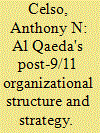

|
|
|
|
|
| Publication |
2012.
|
| Summary/Abstract |
The political transformations under way in the Arab world and the killing of Osama bin Laden raise serious questions about al Qaeda's long-term viability. The secular-liberal Arab Spring protest movement appears to be winning the war of ideas over al Qaeda's violent religious fundamentalism. Civil disobedience campaigns in Tunisia and Egypt succeeded in forcing regime change in ways that a decade of al Qaeda terror attacks failed to accomplish. While it is too soon to write al Qaeda's obituary, its erosion came well before the death of its historic leader. This essay examines al Qaeda's post-9/11 evolution, its strategy, and its steady fragmentation. Since the destruction of its Taliban Afghan sanctuary, al Qaeda has been through many mutations, none of which, over time, has been successful. This essay argues that al Qaeda's failures in Iraq contributed substantially to the organization's decline.
|
|
|
|
|
|
|
|
|
|
|
|
|
|
|
|
| 2 |
ID:
120445
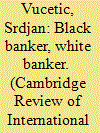

|
|
|
|
|
| Publication |
2013.
|
| Summary/Abstract |
Critical study of the 'global colour line' usually begins by observing similarities between the colonial-colonized relationship on the one hand, and the developed-developing relationship on the other. Despite the dramatic historical changes in human equality over time, both relationships are sometimes qualified with reference to race and racism. This article reflects on these continuities and changes via two debates in the philosophy of race: the 'onto-semantic' and the 'normative'. Each of these debates, I argue, can help international relations (IR) better understand the complex social meanings and political transformations of the global colour line. After I have made a case for the use of categories of racialization and racialized identity over the category 'race', I suggest that IR theorists, too, should pay more critical attention to the burgeoning literatures on racial habits and racial cognition.
|
|
|
|
|
|
|
|
|
|
|
|
|
|
|
|
| 3 |
ID:
128175
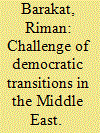

|
|
|
|
|
| Publication |
2012.
|
| Summary/Abstract |
The younger generation should focus on gradual and systematic social change that includes promoting human rights values and various freedoms.
|
|
|
|
|
|
|
|
|
|
|
|
|
|
|
|
| 4 |
ID:
119427


|
|
|
|
|
| Publication |
2013.
|
| Summary/Abstract |
Although the role of intelligence services has been addressed in many recent discussions of the democratization process, yet it has not yet generally been pursued sufficiently by academics and politicians. 1 Mongolia and its intelligence services have been among those countries undergoing a democratic transition and consolidation process. Mongolia is the only formerly Communist Asian state whose democratization process has not regressed. In fact, since 1990, electoral democracy has become the "only game in town," where space for a vibrant civil society exists, and the security institutions have remained outside of the political and economic contests. 2 Approval in early 2012 of the law on conflicts of interest, a set of laws concerning the judiciary, revisions of the election law, and a sustained public demand for good governance are signs of a healthy nascent democracy, one which admittedly still has room for improvement. 3 Unique in the region, Mongolia's security organizations-the military, intelligence agencies, and police-have remained mostly outside of this political transformation. The role of these security institutions in the quest for democratization has often been ignored because of a misperception about their roles and centrality, and the reality of the Soviet military presence in Mongolia during the Cold War.
|
|
|
|
|
|
|
|
|
|
|
|
|
|
|
|
| 5 |
ID:
133126
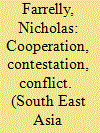

|
|
|
|
|
| Publication |
2014.
|
| Summary/Abstract |
In the period of social and political transformation that followed the election of President Thein Sein, ethnic politics remained a major preoccupation for the Myanmar government, ethnic peoples and the international community. Explaining the varieties of ethnic political interests that are emerging requires a new analytical framework in which the nascent electoral system is given adequate attention. This article argues that cooperation and contestation are now vying with conflict as primary drivers of ethnic politics. To account adequately for the interaction of these concepts, the article introduces various pieces of evidence concerning the different manifestations of ethnic political interests today. It describes an ambiguous situation in which the overall pattern of ethnic politics is changing rapidly. The challenge remains of fully reconciling Myanmar's diverse peoples and including them in one political system.
|
|
|
|
|
|
|
|
|
|
|
|
|
|
|
|
| 6 |
ID:
145955
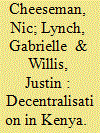

|
|
|
|
|
| Summary/Abstract |
Kenya's March 2013 elections ushered in a popular system of devolved government that represented the country's biggest political transformation since independence. Yet within months there were public calls for a referendum to significantly revise the new arrangements. This article analyses the campaign that was led by the newly elected governors in order to understand the ongoing disputes over the introduction of decentralisation in Kenya, and what they tell us about the potential for devolution to check the power of central government and to diffuse political and ethnic tensions. Drawing on Putnam's theory of two-level games, we suggest that Kenya's new governors have proved willing and capable of acting in concert to protect their own positions because the pressure that governors are placed under at the local level to defend county interests has made it politically dangerous for them to be co-opted by the centre. As a result, the Kenyan experience cannot be read as a case of ‘recentralisation’ by the national government, or as one of the capture of sub-national units by ‘local elites’ or ‘notables’. Rather, decentralisation in Kenya has generated a political system with a more robust set of checks and balances, but at the expense of fostering a new set of local controversies that have the potential to exacerbate corruption and fuel local ethnic tensions in some parts of the country.
|
|
|
|
|
|
|
|
|
|
|
|
|
|
|
|
| 7 |
ID:
161056
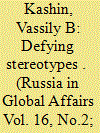

|
|
|
|
|
| Summary/Abstract |
n this article the author probes into how the Democratic People’s Republic of Korea and its political regime managed to survive in defiance of internal economic problems and external political, economic and military pressures it experienced since 1991. Comparison of the available statistics illustrating North Korea’s economic and internal political situation, as well as pressure methods and tactics used on a smaller scale against a far stronger country, the Soviet Union, during the Cold War, allows for taking a fresh look at the effectiveness of foreign policy instruments the United States created during its confrontation with the Soviet Union. Consolidation of the country’s ruling elite amid foreign pressures and exposure to external threats are identified as factors that play the decisive role in determining the outcome of the standoff. The effectiveness of pressure strategies apparently depends on this factor
|
|
|
|
|
|
|
|
|
|
|
|
|
|
|
|
| 8 |
ID:
130928
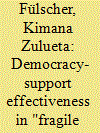

|
|
|
|
|
| Publication |
2014.
|
| Summary/Abstract |
Processes of political transformation and external assistance in fragile states have received increasing attention in the academic literature over the past decade. This literature, however, has not yet adopted a multi-dimensional categorization of fragility. This article discusses the evolution of the concept of fragility, and assesses the growing literature on processes of political transformation in fragile states, with a special focus on the quantitative literature and on the effectiveness of external democracy-support policies. Its novelty lies in its contribution to drawing links between these parallel bodies of literature. Furthermore, this article argues that, by incorporating a more complex definition of fragility, future research could reach more nuanced approaches on how fragility influences both processes of democratization and the effectiveness of democracy-support policies.
|
|
|
|
|
|
|
|
|
|
|
|
|
|
|
|
| 9 |
ID:
123653
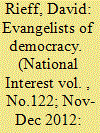

|
|
|
|
|
| Publication |
2012.
|
| Summary/Abstract |
LIKE THE human-rights movement, democracy promotion is a radical project of social and political transformation whose adherents will not or cannot acknowledge either the ideological or the revolutionary character of their enterprise. In this, democracy promotion should be understood as a subset of contemporary liberalism-the only major modern ideology that denies it is an ideology at all. More precisely, it is the end state of human political organization after all the other ideologies have withered away, the future's moral default position.
|
|
|
|
|
|
|
|
|
|
|
|
|
|
|
|
| 10 |
ID:
102138
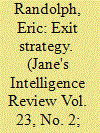

|
|
|
| 11 |
ID:
132976
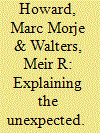

|
|
|
|
|
| Publication |
2014.
|
| Summary/Abstract |
Political scientists have been caught by surprise by some of the world's most dramatic political transformations. To assess how the discipline fared in explaining two of the most large-scale and unexpected developments of the past decades, we compare scholarship around the time of popular mobilization in Eastern Europe in 1989 and the Arab world in 2011. We argue that while scholars cannot be expected to predict utterly extraordinary events such as revolutions and mass mobilization, in these two cases disciplinary trends left scholars ill-prepared to explain them. Political scientists used similar paradigms to study both regions, emphasizing their failure to develop politically and economically along the lines of Western Europe and the United States. Sovietologists tended to study the communist bloc as either anomalously totalitarian or modernizing towards "convergence" with the West. Likewise, political scientists studying the Arab world focused disproportionately on the prospects for democratization or the barriers to it, and they now risk treating the 2011 protest movements essentially as non-events if they are not clearly tied to institutional democratic reform. By broadening their research agendas beyond a focus on regime type, political scientists will be better prepared to understand future changes in the Middle East and elsewhere.
|
|
|
|
|
|
|
|
|
|
|
|
|
|
|
|
| 12 |
ID:
138421
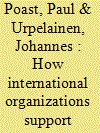

|
|
|
|
|
| Summary/Abstract |
Democratization in the developing world is, according to Samuel Huntington, “an important—perhaps the most important—global political development of the late twentieth century.” While scholars of comparative politics have explored the domestic political economy of democratic transitions, they, along with scholars of international relations, also recognize that international actors, particularly international organizations (IOs), are crucial for successful political transformation.
|
|
|
|
|
|
|
|
|
|
|
|
|
|
|
|
| 13 |
ID:
130384
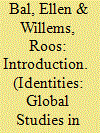

|
|
|
|
|
| Publication |
2014.
|
| Summary/Abstract |
This special issue addresses the imagination of futures 'away from home' in a globalising world. While a growing number of migration scholars have taken into account that migration considerations are always socially embedded and culturally informed, the processes at work among a mounting number of (young) men and women throughout the world, who are convinced that a better life can only be found 'away from home', have been notably understudied. This special issue goes beyond the study of migration aspirations as a question of migration only. It focuses on the specific contexts (in five different countries) within which migration dreams are born, and sometimes even cultivated. It explores the sociocultural embedding of these aspirations by investigating the interpretation of local realities versus global possibilities, and examines how the aspirations of so many worldwide link up to the wider interconnections between globalisation and the sociocultural, political and economic transformations 'back home'.
|
|
|
|
|
|
|
|
|
|
|
|
|
|
|
|
| 14 |
ID:
132528


|
|
|
|
|
| Publication |
2014.
|
| Summary/Abstract |
Turkey is a negotiating candidate for the EU membership. Though the accession negotiations between Turkey and the EU continue in the official sense, in reality, the relations are in a deadlock. It is often argued that Turkey-EU relations have entered a new era since January 2013, and new optimistic comments have emerged. This paper argues that there exists a pull-push balance in the accession process for the EU that normally attracts candidates and makes them more vulnerable to the EU conditions. The success of the political transformation of eastern European states relied to a large extent on the balanced pull-push accession processes. It is argued here that this balance for Turkey has been deteriorated and this fact has made the EU ineffective in transforming Turkish politics and polity. Therefore, this paper argues for the re-establishment of the balance to improve and normalize Turkey-EU relations.
|
|
|
|
|
|
|
|
|
|
|
|
|
|
|
|
| 15 |
ID:
145570
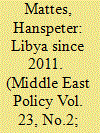

|
|
|
| 16 |
ID:
074890
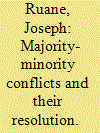

|
|
|
|
|
| Publication |
2006.
|
| Summary/Abstract |
How and under what conditions of political and cultural transformation does long-run majority-minority communal conflict come to an end? What is the role of change in identity, power relations and constructions of community? This article looks at three cases of religious and ethno-religious conflict: Catholic-Protestant relations in France, the Republic of Ireland and the island of Ireland. It employs a systemic theory of communal conflict and a path dependence model of persistence over time. It argues that an end to conflict depends on undoing structural and cultural lock-in, and identifies the way in which this has-or has not-happened in each case.
|
|
|
|
|
|
|
|
|
|
|
|
|
|
|
|
| 17 |
ID:
108634
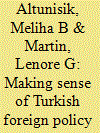

|
|
|
|
|
| Publication |
2011.
|
| Summary/Abstract |
Employing the four categories of change as defined by Charles Hermann and the insight of Walter Carlsneas that the dynamic between structure and agency causally condition each over time, the article conceptualizes change in Turkish foreign policy under the AKP. This theoretical analysis of Turkey's foreign policy allows for the examination of the interplay of domestic actors with the regional and international systems including their economic, identity and security components. It also explores the impact Turkey's activism in the area has had in Turkey and among the people of the region. Finally, it raises key questions as to the future of Turkish foreign policy as the outcomes of the Arab Spring develop.
|
|
|
|
|
|
|
|
|
|
|
|
|
|
|
|
| 18 |
ID:
131748


|
|
|
| 19 |
ID:
137548
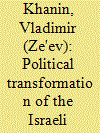

|
|
|
|
|
| Summary/Abstract |
The Great Aliya from the USSR and the post-Soviet states began a quarter of a century ago, bringing to Israel about 1.1 million Russian-speaking Jews and their family members. This population corresponds to approximately 19 Knesset seats, and is thus a crucial factor in Israeli electoral politics. From the late 1990s this community was almost equally divided in its sympathy between nationwide mainstream parties and Russian sectarian immigrant parties. However, if previously there were either purely sectarian or nationwide parties, in the past decade the majority of Russian Israelis prefer new types of political representation: either a ‘Russian party with an Israeli accent’ (mainly Israel Beiteinu) or an all-Israeli party with some Russian accent (i.e. Likud). Nevertheless, despite the similarities in the ideological orientations and socioeconomic views, the Russian-speaking supporters of both political parties represent two distinct political cultures among the Israeli community of former Soviet Union olim and their children. This may explain why the joint list of Likud–Israel Beiteinu during the 2013 Knesset elections experienced substantial losses of each party's traditional ‘Russian’ (as well as general) voters, many of whom opted this time for parties of the ‘contentious middle class’ – the right-wing Habayit Hayehudi and ‘centrist’ Yesh Atid. This article argues that in the coming years, the Russian community's politics in Israel will continue to search for an optimal model of combination of a party's ethnic base with a mainstream platform, and which constitute an exemplary model and inspiration of political participation for other ethnic or cultural identity oriented groups, such as English-, French- and Amharic-speaking immigrants, and for the ‘new haredim’.
|
|
|
|
|
|
|
|
|
|
|
|
|
|
|
|
| 20 |
ID:
133201


|
|
|
|
|
| Publication |
2014.
|
| Summary/Abstract |
The arts hold a minor to society and directly influence the development of the human imagination.
|
|
|
|
|
|
|
|
|
|
|
|
|
|
|
|
|
|
|
|
|